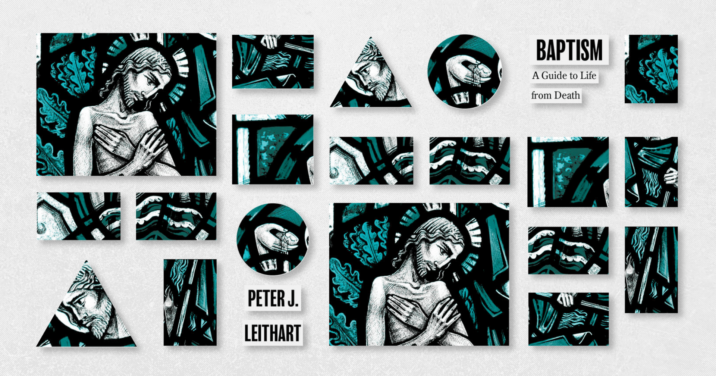How would you describe the church’s contemporary division over baptism?
Baptism is supposed to be a sign of unity (Eph 4:4–6). Everyone is baptized into one Christ, becoming a member of the one body, members of one another. Baptism is a solvent of fleshly identities and divisions, such as “Jew” or “Greek” (1 Cor 12:12–13; Gal 3:28–29), such as “Lutheran” or “Methodist” or “Presbyterian” or “Roman Catholic.” By baptism, we’re all made part of the same family, sharing the Triune family name. It’s a travesty of baptism, and of the gospel, that we fight over this sign of unity and that we treat other baptized Christians as if they were outsiders. We’re Corinthians, boasting of our baptism in a name other than the name of Jesus.
Given this divide, what did you set out to do with your new book, Baptism: A Guide to Life from Death?
I don’t think we can resolve our debates about baptism without restarting the whole discussion, and that means returning to basics. We need a renewal of baptismal imagination, and that happens when we regain a biblical vision of baptism. Creation, the flood, the exodus, the rites of purification, the crossing of the Jordan, Elisha’s water miracles, Jonah’s “death and resurrection”—all these should inform our understanding of what happens in baptism. That’s what I tried to do in the book.
What’s the good news of baptism that all Christians can affirm regardless of denomination or tradition?
The New Testament links baptism to every blessing of salvation. Baptism marks us with the name of the Trinity, washes sin, confers the Spirit, unites us with Jesus in His death and resurrection, justifies, sanctifies, makes us a member of the Spirit-filled body, clothes us with Christ, regenerates, and saves. Behind all these is the promise that baptism brings us into the new life of the church. Baptism is the gospel in water, addressed to the baptized. As I say in the book, baptism is the gospel packaged with your name on it.
How does baptism help or influence your Bible reading and Bible teaching?
It probably influences my teaching and preaching more directly than it does my Bible reading. In the liturgy, pastors preach to the baptized. We preach to those who wear the name of Christ and belong to Him. We shouldn’t be preaching in a way that undermines their confidence in God’s claim and promise. We should be encouraging them to “consider themselves” dead to sin and alive to righteousness. That doesn’t lead to soft preaching. Paul’s sharpest exhortations are based on the fact that his readers are baptized. Because they’re baptized, he holds them accountable to live out their baptism.
How should baptism shape our regular, everyday life?
It should give us confidence, courage, even a kind of audacity. It’s said that Luther would make the sign of the cross on his forehead to remind himself of his baptism whenever he faced severe trials. In baptism, Jesus claims us as His own; no matter what pressures or attacks we encounter, we belong to Him, body and soul. Baptism calls us to follow Jesus, to take up our cross to be bold witnesses, even in the face of death. Baptism is a call to martyrdom, and an assurance that, alive or dead, we are Christ’s.
What’s one thing you wish every Christian knew about baptism?
Can I mention two? The first is that baptism is God’s act, not ours. He claims us, not we Him. Of course, we have to submit to His claim, and that’s a lifelong demand. But our love for Him is a response to His prior gift. The second is that baptism incorporates us into the church. The conflicts over baptism aren’t fundamentally conflicts about baptism per se. They’re conflicts about the nature of the church. To grasp what baptism is and does, we have to be convinced that the church is what Scripture says it is—the family of the Father, the body of the Son, and the temple of the Spirit. Everything else follows from that.
What’s something new and interesting you learned in the writing process (but that might not have made it into the book)?
I’ve read patristic writings on baptism in the past, but I was impressed again with how deeply and thoroughly biblical they are. Next to Scripture, the church fathers are our best source of renewing our baptismal imagination.

***
This article was originally published in the July/August 2021 issue of Bible Study Magazine. Slight adjustments, such as title and subheadings, may be the addition of an editor.
Related articles
- Why Do Christians Disagree over Baptism? 4 Considerations
- The Meaning of Baptism—and How It Makes the Gospel Visible
- 7 Bible Verses about Baptism
Related resources





